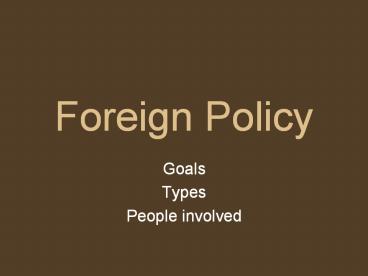Foreign Policy - PowerPoint PPT Presentation
Title: Foreign Policy
1
Foreign Policy
- Goals
- Types
- People involved
2
Foreign Policy Goals
- Maintaining National Security
- - to protect the rights, freedoms, and property
of the United States and its people - Supporting Democracy
- - aid democratic nations as well as move them
toward democracy
3
Foreign Policy Goals
- Promoting World Peace
- - the more nations at peace, the less likely the
U.S. will be drawn into an existing conflict - Providing Aid to People in Need
- - assume the responsibility of providing
humanitarian and other relief to foreign countries
4
Foreign Policy Goals
- Establishing Free and Open Trade
- - increases the size of the market to which
domestic businesses can sell their goods - - gives U.S. consumers a chance to buy goods
from around the world
5
Types of Foreign Policy
- 1. Isolationism
- A view that a nation should tend to its domestic
affairs rather than to international affairs - 2. Realism
- Believe an internationalist approach taking an
active role in international affairs to promote
U.S. interests - Military intervention when necessary
6
Types of Foreign Policy
- Neoisolationism
- - foreign involvement should be kept to a
minimum - - not only for the good of the United States but
also because such involvement is likely to be bad
for nations in whose affairs the U.S. would
intervene
7
Types of Foreign Policy
- Idealism
- - want an internationalist foreign policy
- - are motivated by what is good for other
countries as well as the U.S. - - support democratic values everywhere
8
Role of the President
- Influence through general acceptance
- Congress and the American people give the
president the authority to make policy decisions
as needed - Influence as commander in chief
- Used to order short-term military strikes
- commit forces to serve in what have been called
undeclared wars - Influence through executive agreements
- Formal understandings with foreign governments
9
Role of the Department of State
- Have bureaus dealing with specific regions of the
world - 2. Have bureaus dealing with issues such as
human rights, drug trafficking, and environmental
and scientific matters
10
Role of the Department of State
- Maintain embassies and consulates
- a. Embassy diplomatic center
- b. Ambassador the chief diplomatic official
at each embassy - - a personal representative of the president
- - receive the post as a reward for supporting
the president or his party
11
Role of the Department of State
- Maintain embassies and consulates
- c. Consulate deal with U.S. commercial
interests - d. Consul head of a consulate
- - appointed by the president
- - confirmed by the Senate
- e. Foreign Service members of the State
Department who serve abroad
12
Role of the Department of State
- Issuing Passports and Visas
- a. Passport
- - a formal document issued by a government to
one of its citizens for travel to other countries
13
Role of the Department of State
- Issuing Passports and Visas
- b. Visa
- - a seal that is placed on foreign passports
that entitles their holder to enter the U.S.
14
Role of the US Department of Defense
- Headquarters are the Pentagon
- 34 acres
- 800,000
- civilians
- 1.4 million
- members of the
- armed forces
15
Pentagon
16
Role of the US Department of Defense
- Joint Chiefs of Staff
- Most influential military advisors
- chair (selected by the president)
- Army chief of staff
- Chief of naval operations
- Air Force chief of staff
- Marine Corps commandant
17
Role of the CIA
- A single organization responsible for providing
the president with foreign intelligence
(information about the activities of other
governments) - Gather information related to national security
- Analyze that information
- Brief the president and the National Security
Council - Engage in covert (secret) operations































